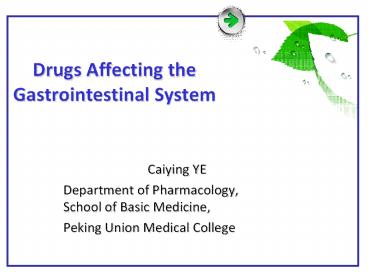Drugs Affecting the Gastrointestinal System
1 / 31
Title:
Drugs Affecting the Gastrointestinal System
Description:
Drugs Affecting the Gastrointestinal System Caiying YE Department of Pharmacology, School of Basic Medicine, Peking Union Medical College Drugs Affecting the ... –
Number of Views:276
Avg rating:3.0/5.0
Title: Drugs Affecting the Gastrointestinal System
1
Drugs Affecting the Gastrointestinal System
- Caiying YE
- Department of Pharmacology, School of Basic
Medicine, - Peking Union Medical College
2
Drugs Affecting the Gastrointestinal System
- Antiulcerants
- Digestives
- Antiemetics
- Purgatives
- Antidiarrheals
- Cholagogues
3
Peptic Ulcers
- Common disease,incidence rate 1012.
- Pathogenesis of ulcers
- Aggressive Factors
Defensive Factors
- Mucus,bicarbonate layer
- Blood flow,cell renewal
- Prostaglandins
- Phospholipid
- Free radical scavengers
- Acid,pepsin
- Bile salts
- Drugs (NSAIDs)
- H.pylori
4
Peptic Ulcers
- Therapy Purpose
- Therapy is directed at enhancing host defense
or eliminating aggressive factors i.e., H.
pylori.
5
Drugs Used in Peptic Ulcers
- Antacids
- Inhibitors of gastric acid production
- H2-receptor antagonists
- Proton pump inhibitors
- Muscarinic antagonists
- Gastrin receptor antagonist
- Mucosal Protectants
- Anti-Helicobacter pylori. drugs
6
Drugs Used in Peptic Ulcers
- Antacids
- aluminum hydroxide
- magnesium hydroxide
- H2- receptor antagonists
- cimetidine
- ranitidine
- Muscarinic antagonists atropine
7
Drugs Used in Peptic Ulcers
- Proton pump inhibitors omeprazole
- Gastrin receptor antagonist proglumide
- Mucosal Protectants misoprostol
- Anti-Helicobacter pylori. Drugs antibiotics
8
Antacids
- General characteristics
- Antacids are weak bases that are taken orally and
that partially neutralize gastric acid and reduce
pepsin activity. - Antacids reduce the pain associated with ulcers
and may promote healing. High doses are required
for healing 40 mEq of base seven times daily.
9
Antacids
- Magnesium hydroxide
- Magnesium trisilicate
- Aluminum hydroxide
- Calcium carbonate
- Sodium bicarbonate
10
H2-receptor antagonists
- Mechanism of action
- Competitively block the histamine (H2) receptor
of acid-producing parietal cells - rendering cells less responsive to not only
histamine but also to the stimulation of
acetylcholine and gastrin. - Also up to 90 inhibition of vagal stimulated and
gastrin stimulated acid secretion. - complete inhibition has not been shown
11
H2-receptor antagonists
- Four FDA-approved
- Cimetidine (Tagamet)
- Ranitidine (Zantac)
- Famotidine (Pepcid)
- Nizatidine (Axid)
- Roxatidine
12
H2-receptor antagonists
- Therapeutic effects
- Promote the healing of gastric and duodenal
ulcers - Gastroesophageal reflux dz GERD
- Upper GI bleed GIB
- May be effective in stress ulcers peptic
esophagitis
13
H2-receptor antagonists
- Side effect
- Overall low lt 3
- CNS lt 1 total
- headache, lethargy ,confusion,
depression,hallucinations - ENDO
- Impotence ,increased prolactin ,gynecomastia
- HEME
- Thrombocytopenia
14
Muscarinic antagonists
- Atropine
- Block the M1 class receptors
- reduce acid production
- abolish gastrointestinal spasm
- relatively unpopular as a first choice because of
high incidence of anticholinergic side effects
(dry mouth and blurred vision)
15
Proton pump inhibitors
- H,K-ATPase (Proton Pump) inhibitor
- Irreversible inhibition
- Must synthesize new enzyme
- Long duration
- Omeprazole (Prilosec)
- Lansoprazole (Prevacid)
- Pantoprazole
- Rabeprazole
16
Mechanism of Action
17
Omeprazole(losec)
- Irreversibly binds to H/K ATPase
- Prevents H ion production secrection
- Block all acid secretion achlorhydria
- to return to normal must synthesize new H/K
ATPase - Inhibit H. pylori
18
Omeprazole(losec)
- Therapeutic uses
- Gastroesophageal reflux dz GERD
- Peptic ulcer
- Infection with H. pylori plus(Hp)
- Upper GI bleed GIB
19
Lansoprazole
Omeprazole
Pantoprazole
20
Gastrin receptor antagonist
- Proglumide
21
Mucosal Protective Agents
22
Misoprostol
- A congener of prostaglandin E1
- PGs
- inhibit gastric acid secretion
- exhibit cytoprotective activity
- enhance local production of mucus or
bicarbonate - promote local cell regeneration
- help to maintain mucosal blood flow
23
Misoprostol
- Misoprostol is approved for use in patients
taking NASIDs who are at risk for gastric ulcers - Misoprostol produces diarrhea and stimulation of
uterine contraction.
24
- Sucralfate
- cytoprotective agent
- stress ulcerations PUD
- inhibit H. pylori
- Bismuth (Pepto-Bismol)
- inhibit pepsin activity
- inhibit H. pylori
25
Agents Used in infection of Helicobacter Pylori
- Helicobacter pylori,HP
26
Agents Used in infection of Helicobacter Pylori
- Aimed at eliminating H. pylori
- Bismuth ( Pepto-Bismol)
- Gentamicin
- Amotriptyline (Amoxil )
- Clarithromycin
- Tetracycline (Achromycin V )
- Metronidazole (Flagyl )
27
Antacids
Before 1970
1970
H2-receptor antagonists
Proton pump inhibitors
1980
Proton pump inhibitors Agents Used in infection
of Helicobacter Pylori
1990
28
Digestives
- Pepsin
- Pancreatin
- Lactasin
29
Antiemetic Drugs
- Vomiting reflex
- a coordinated reflex controlled by a bilateral
vomiting center in the dorsal portion of the
lateral reticular formation in the medulla - Pharmacologic intervention
- relies on inhibition of inputs or depression of
the vomiting center.
30
Antiemetic Drugs
- Histamine1-receptor antagonist
- Cholinergic antagonist
- Dopamine antagonists
- Metoclopramide
Domperidone (motilium) - Therapeutic uses
- Side effects
- 5-HT3 antagonists
- Cannabinoids
D2-receptor antagonist (periphery) A weaker
antiemetic, fewer extrapyramidal
effects. Accelerates gastric emptying has little
effect on the colon
31
Thank you!































